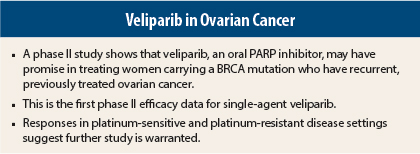Veliparib, an oral poly(ADP-ribose) polymerase (PARP) inhibitor, appears to be of value in treating women with BRCA-mutated gynecologic cancers that are resistant to other therapies. These preliminary findings of a phase II study support the concept that BRCA-associated ovarian cancers are sensitive to veliparib.
PARP Inhibitor Therapy
Veliparib targets the PARP enzyme, an important factor in repairing single-strand DNA injury, resulting in cell death in situations where higher-fidelity repair mechansims are lacking. This situation is called “synthetic lethality,” explained lead author Robert L. Coleman, MD, of The University of Texas MD Anderson Cancer Center, Houston, at the Society of Gynecologic Oncology (SGO) Annual Meeting.1
Previous studies have suggested that veliparib was effective in combination with chemotherapy for gynecologic cancers. The multicenter phase II trial presented at the SGO meeting offers the first phase II evidence suggesting that single-agent veliparib has activity in treating resistant cancers in BRCA mutation carriers.
“PARP inhibitors have had limited efficacy evaluation in patients with documented resistance to platinum and other therapies. We found that veliparib appears to be effective in some platinum-resistant patients with recurrent or persistent disease,” said Dr. Coleman.
“The findings of our study demonstrate promising clinical activity and tolerance warranting further investigation of veliparib in this setting. Most of these patients have few other treatment options, and it is encouraging to think we have another potential therapy to offer them,” he added.
Study Data
The study enrolled 52 patients (50 of them evaluable for efficacy and toxicity) with recurrent or persistent measurable epithelial ovarian, peritoneal, or fallopian tube cancer and germline mutations in BRCA1 (78%) or BRCA2 (22%). The majority of cancers (82%) were high-grade serous cell carcinomas. Patients had received up to three prior therapies (with the exception of a prior PARP inhibitor). Thirty patients were platinum-resistant and 20 were platinum-sensitive.
Veliparib was initiated at 400 mg twice daily for 28 days (one cycle), and dose reductions were allowed for toxicity. The median number of cycles given was six (range, 1–22).
Overall response rate was 26%, with 2 complete responses and 11 partial responses. The response rate was 20% in platinum-resistant patients, 35% in platinum-sensitive patients, 26% in BRCA1 carriers, and 27% in BRCA2 carriers.
At the end of the study, 8 patients remained on treatment and 42 were off study (27 due to progression, 11 due to toxicity, and 4 who refused further treatment). At the time of the SGO meeting, median progression-free survival was 8.11 months. At 6 months, 60% of patients were event-free. Overall survival was estimated at 19.7 months.
Adverse Events
Toxicity was acceptable in these heavily pretreated patients. The only grade 4 toxicity was thrombocytopenia, reported in one patient. Grade 3 adverse events included fatigue (n = 2), nausea (n = 2), leukopenia (n = 1), neutropenia (n = 1), dehydration (n = 1), and elevated alanine transaminase level (n = 1).
Grade 2 adverse events that were reported in more than 10% of patients included nausea (46%), fatigue (26%), vomiting (16%), and anemia (14%). Dose reductions for toxicity were needed in 24 patients (48%). ■
Disclosure: Dr. Coleman reported no potential conflicts of interest.
Reference
1. Coleman RL, Sill M, Aghajanian C, et al: A phase II evaluation of the potent, highly selective PARP inhibitor veliparib in the treatment of persistent or recurrent epithelial ovarian, fallopian tube, or primary peritoneal cancer in patients who carry a germline BRCA1 or BRCA2 mutation. SGO Annual Meeting. Abstract 136. Presented March 25, 2014.



